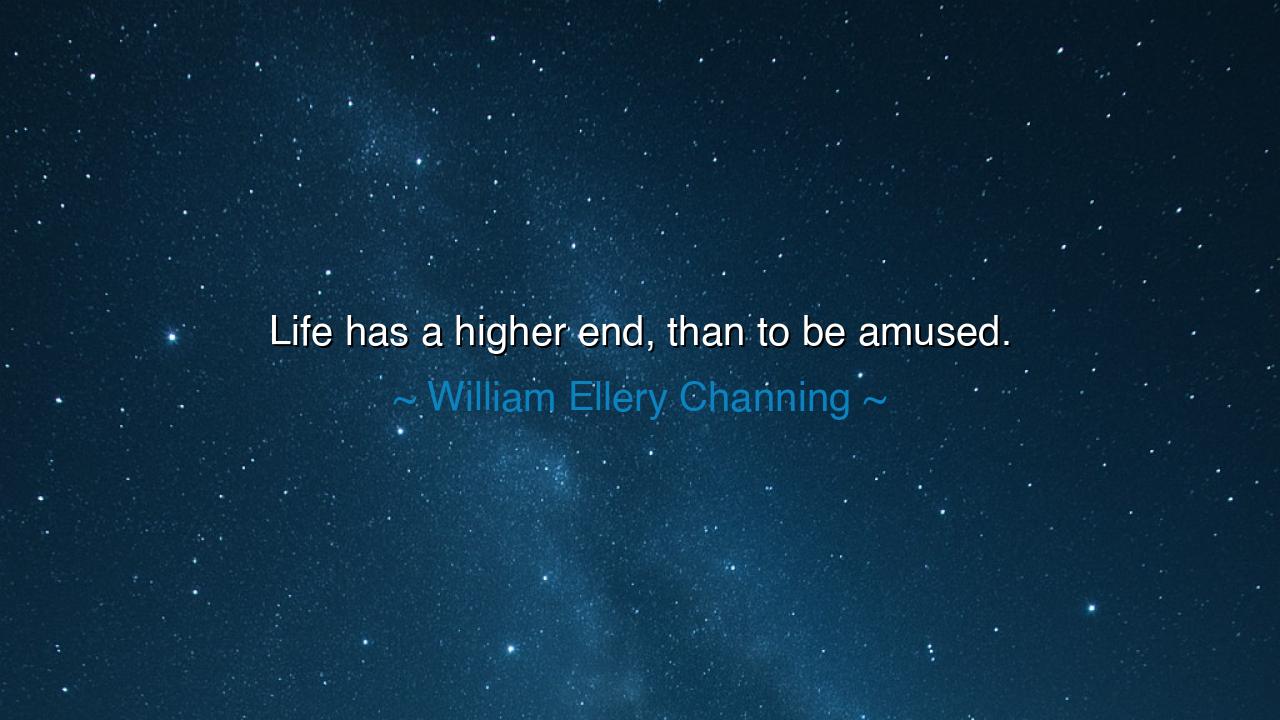
Life has a higher end, than to be amused.






When William Ellery Channing, the gentle voice of American idealism, wrote, “Life has a higher end, than to be amused,” he spoke to a restless world already tempted by distraction. His words, though simple, strike like a bell in the quiet soul — a call to awaken from the dream of pleasure to the purpose of being. Channing, a minister of conscience and reform, lived in an age of rising comfort and moral complacency. He saw men chasing novelty while neglecting virtue, and he warned that amusement, though innocent in moderation, can become the veil that blinds us to the sacred work of growth, service, and truth.
Born in the late eighteenth century, Channing was a pioneer of the Unitarian movement — a man of deep faith, reason, and compassion. He believed that the divine spark lives in every human heart, and that the highest purpose of life is not entertainment but spiritual elevation. When he said that life’s true end is higher than amusement, he did not condemn joy, but sought to distinguish between pleasure and fulfillment, between a momentary thrill and a lasting peace. For him, to live well was not to escape suffering, but to find meaning within it, to turn one’s brief existence toward something eternal.
In his time, as in ours, society was drawn toward ease. The comforts of progress — wealth, invention, spectacle — promised happiness but often delivered emptiness. Channing saw that when the mind is lulled by constant amusement, the soul forgets to strive. “Life,” he might have said, “is not a theater for watching shadows but a temple for becoming light.” Amusement is not evil, but it is small. It numbs the hunger of the heart when that hunger was meant to guide us toward wisdom, compassion, and self-mastery. The human spirit, like an eagle, cannot live forever among toys; it must one day rise toward the sun of purpose.
To understand Channing’s wisdom, look to the story of Viktor Frankl, the psychologist who endured the concentration camps of Nazi Germany. Stripped of every comfort, facing death each day, he discovered that even in misery there is a greater calling — to choose one’s attitude, to hold to one’s values, to find meaning in service to others. Frankl later wrote, “Those who have a why to live can bear almost any how.” His insight, born in the darkest pit, echoes Channing’s truth: that life’s worth lies not in amusement, but in meaning — in what we give, not what we consume.
Amusement, when it becomes the aim of existence, breeds spiritual laziness. It dulls the moral imagination and makes men spectators rather than creators. A people devoted only to entertainment become passive, forgetting that joy without purpose decays into emptiness. Channing’s words remind us that the soul was not made for mere pleasure, but for greatness — for kindness, learning, faith, and justice. To live for amusement is to trade the infinite for the trivial, the eternal flame for the flicker of passing delight.
Yet, Channing’s teaching is not an invitation to ascetic gloom. He does not forbid laughter or beauty; he calls us to let joy serve truth. True joy, he believed, arises when we act in harmony with the divine purpose — when our talents uplift others, when our labor refines the heart, when our pleasures deepen gratitude instead of feeding vanity. Even the simplest life, if lived with awareness and love, reaches higher than any life spent chasing diversion. The heart at peace with its duty knows a happiness that no spectacle can imitate.
So let the lesson be this: seek not amusement, but awakening. Enjoy the world’s pleasures, but do not become their slave. Ask not, “How may I be entertained?” but “How may I grow?” Do one thing each day that enlarges your spirit — a kindness offered, a truth pursued, a silence kept in reverence. Let your life be a flame that gives light, not a spark that burns out in laughter.
For as William Ellery Channing reminds us, life is not a theater of distractions, but a journey of becoming. To live well is to rise each day with eyes lifted above the noise, to labor for truth, to serve with love, and to remember that every breath is a gift meant to build something enduring. For amusement passes, but purpose — purpose is the seed of immortality.






AAdministratorAdministrator
Welcome, honored guests. Please leave a comment, we will respond soon